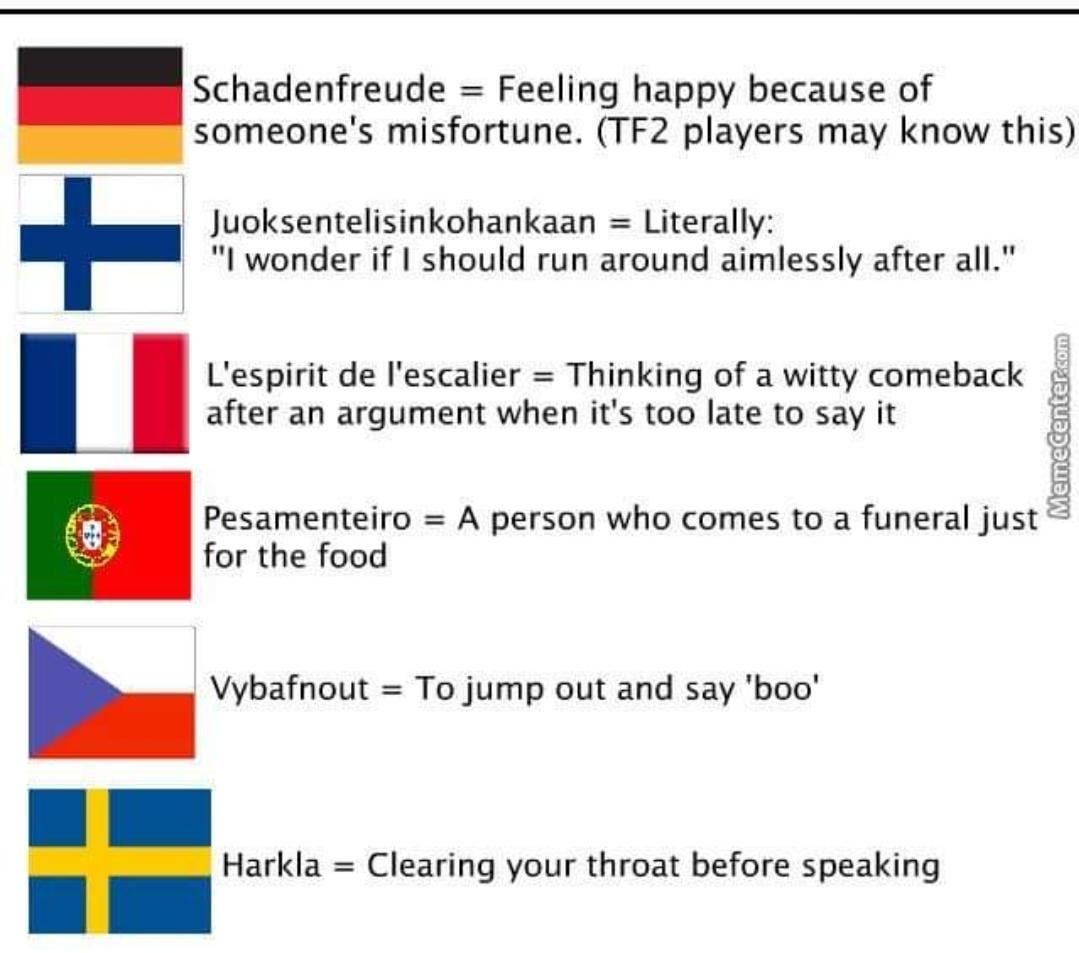How Learning a New Language Can Teach You About Yourself
Finding words to express how you truly feel
Welcome, aspiring polyglot! One of the best parts about learning a new language is finding out that there are words in other languages that simply do not have translations. That is the main reason I always say it is important to speak the same language as your grandparents and your significant other. While it is certainly possible to communicate together through a language barrier, if you can’t understand a word because it does not exist in English you will never be able to truly comprehend what is being said.
It will take time to understand what the meaning of these new words is, but using them and hearing them be used should be illuminating. Not only that, but the better you can express any range of emotions the easier it will be to speak precisely. Coming soon we will bring back our friend Sim Van Daele to discuss how the words we use develop our thought processes and impact our psyche. It may or may not shock you to know, the way we speak directly impacts our personality, psychology, and self perception.
Adding foreign words to your vocabulary
As far as where to look, there are tons of places, but the best method is to simply immerse yourself in your language of choice. Sooner or later you will come across one of those words and it will then be incumbent upon you to find ways to use it. Here are my top 5 in different languages and their respective meanings:
1. 一期一会 (ichi-go ichi-e)
This directly translates to “one time, one meeting” from Japanese to English. The meaning, as will be the case with all of these, goes far beyond the direct translation. What it truly means is that every encounter is a once in a lifetime experience and we should treasure the unrepeatable nature of each moment. Something that takes a full complex sentence to express in English can be expressed far more simply in Japanese.
2. Heraeth
This is a Welsh word that means a spiritual longing for a home that maybe never even existed. Nostalgia for ancient places to which one cannot return. It is the echo of the lost places of one’s soul’s past and one’s grief for it. In the wind, the rocks, and the waves, it is everywhere and it is nowhere. This concept goes deeper in the Welsh tradition than just the definition shared here and it’s important to honor the meaning behind it as well.
Hiraeth is an experience held by the Welsh people of being systematically erased. Their language, culture, dress, and more were outlawed so it is a cultural word to represent the loss of the future of their people and what could have been. Most people of most cultures can likely relate to this feeling on one level or another, but it is interesting that some cultures have created words to encapsulate this feeling.
3. Soubhiyé
This is a beautiful Lebanese word that captures the quiet magic of early mornings. In those precious moments, before everyone wakes up, it’s a time to enjoy the gentle hush of dawn. Whether you savor the stillness or sip on a cup of coffee, Soubhiyé is your personal retreat, a peaceful pause before the day unfolds. Anyone who considers themselves a morning person knows precisely the emotion this word seeks to convey. Night owls might not quite understand, but then there is probably a suitable word out there somewhere for the night owls of the world.
4. ゆとり (Yutori)
Yutori” (ゆとり) comes from the Japanese verb “yutoru” (ゆとる), which means “to be spacious” or “to have room.” It derives from the idea of creating space in one’s life. In the tranquil embrace of a forest, time seems to stretch and expand with each unhurried step.
Light filters through the canopy, casting serene shadows. This is “yutori” – moments where time slows, allowing us to find peace in the gentle rhythm of nature. Like the trees swaying gracefully, it’s about savoring each moment, finding solace in the present, and embracing life’s natural flow.
5. Saudade
Saudade is a Portuguese word that defies direct translation, but it can be described as a deep emotional state of longing, nostalgia, and melancholy. It is often characterized by a profound sense of yearning for something or someone that is absent, whether it be a person, place, or experience. Saudade is deeply rooted in Portuguese culture and is often associated with the country’s history of exploration and colonization.
It is said to have originated during the Great Portuguese Discoveries, when many people left their homeland to explore the world and never returned. Those who stayed behind were left with a deep sense of longing and nostalgia for the absent loved ones. Something many people around the world struggle to properly express in their own languages simply through lacking the requisite vocabulary.
Saudade is often used in everyday conversation in Brazil and other Portuguese-speaking countries to express a deep sense of longing or nostalgia. For example, someone might say “Eu tenho saudades de ti” (I have saudades for you), meaning “I miss you deeply.” If you have any Portuguese speaking friends and they use this word with you, they likely care deeply for you and you should count yourself lucky.
Conclusion
It can be easy to feel like you can’t properly express yourself, even in your mother tongue. Language shapes the world around us and with access to only limited tools you may find yourself frustrated on a consistent basis. Adding a second, third, or fourth language to your repertoire will allow you to fill in some of these blanks as you come across new words that can express complex emotional, mental, and physical states of being.
Language acquisition is incredible and should be fun, but there is more depth to it than many people realize at first. One day you will get to a point where instead of trying to translate a word you just teach those around you a new word in a new language because it is simply better than any explanation you could ever give. That is one of the reasons that being immersed in the culture is just as important as being immersed in the language. Without the cultural background it can be nearly impossible to truly grasp the significance of some of these words
As we discuss often around here, creating is vital in second language acquisition. Speaking and practicing with written language will help you in accelerating and enhancing your language learning process, so start having conversations as early on as possible. It will be difficult, but you can do difficult things and be great. So go do some difficult things and become great.
Eager for more Second Language Strategies?
For more content find me on Twitter or Instagram. If you are struggling to get speaking in your target language, get up to 55% off a Babbel subscription using this link. I look forward to seeing everyone’s progress in the months and years to come. Be sure to check out the YouTube channel as well!
Learning Spanish? We have begun aggregating resources in you Spanish Resource Newsletter!
Don't forget to pick up your very own French Language Logbook or Spanish Language Logbook!






